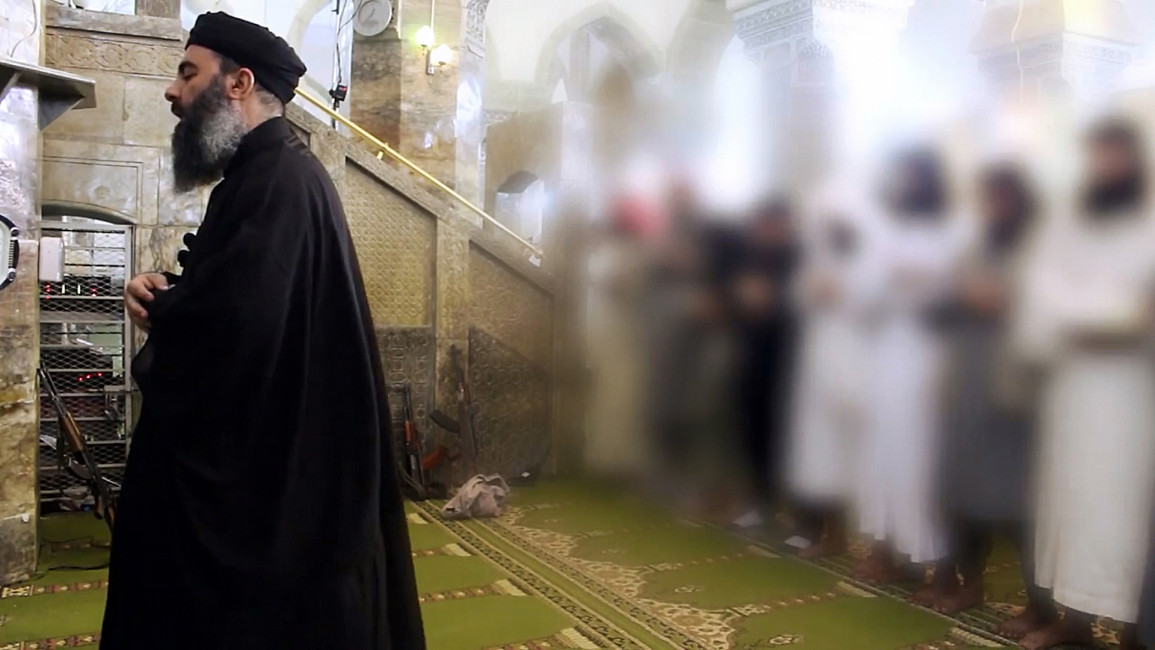Opposition to Baghdadi's leadership emerges within Islamic State group
A schism is opening up within the leadership of the Islamic State group (IS, formerly known as ISIS), according to local and tribal Iraqi sources close to the group.
The split is reportedly due to disputes over the IS' methods and the autocratic style of leadership adopted by self-styled "caliph", Abu Bakr al-Baghdadi.
The sources said that Abu Ghada al-Urdoni, a prominent IS commander and a close associate of former al-Qaeda leader Abu Musab al-Zarqawi, has emerged as a leading figure in opposition to Baghdadi.
A prominent tribal leader in Anbar governorate told al-Araby al-Jadeed there had been sharp disputes between IS leaders due to the mass executions of Sunni tribes in Anbar ordered by Baghdadi.
The source, a member of the general tribal council in Anbar, said that leading Iraqi, Jordanian and Saudi figures in IS objected to Baghdadi's decision to kill hundreds of people from tribes that had fought against them.
| This dispute could lead to the re-emergence of al-Qaeda in Iraq, almost three years after it merged with what is now the IS group. |
"They believed it was sufficient to ask them to repent and guarantee their pledges of loyalty according to the law of war, especially since there was no proof of Baghdadi’s claim they were apostates," he said.
"Baghdadi’s harsh and absolute decisions, taken without consulting other leaders, have resulted in more than 800 deaths among Sunni tribes in just two weeks."
Baghdadi blamed
The sheikh, who spoke on condition of anonymity to protect himself, is currently in the IS-controlled Anbar governorate, and said that leaders such as Abu Ghada al-Urdoni blamed Baghdadi for recent divisions in Iraq.
The group seized huge swathes of Iraq very quickly - even though they had comparatively few fighters, who were pushed to attack well-fortified towns.
Leaders of the armed group have also criticised Baghdadi for granting authority to IS spokesman Abu Mohammad al-Adnani, despite his youth and lack of experience - instead of granting such authority to veteran military and field commanders.
"Complaints about Baghdadi are increasing, and this led him to make recent changes in leadership positions, particularly in Anbar, Nineveh and Tikrit," said the tribal leader.
"Most who complain - and the opposition has been growing for about three weeks - are former members of al-Qaeda in Iraq."
| Next to the bodies, the IS left a paper with two words explaining the reason for their execution: apostate traitors. - Col Ahmed al-Obeidi, Anbar police |
These commanders had been close associates of former al-Qaeda leader Abu Musab al-Zarqawi, said the sheikh. They have reportedly been accused of communicating with al-Qaeda leader Ayman al-Zawahiri, most likely in order to foment divisions within IS, an accusation they are understood to have denied.
"There is a state of confusion prevailing within the IS because of the recent disputes, and battles against other factions in Syria like the Nusra Front might be contributing to the confusion there," said the tribal leader.
He added that he thought it possible this dispute could lead to the re-emergence of al-Qaeda in Iraq, almost three years after it merged with what is now the IS group.
Colonel Ahmed al-Obeidi from the Iraqi police command in Anbar told al-Araby that the IS executed five of its own members in the town of al-Qaem west of Anbar last Sunday, including one Syrian and one Saudi.
"Next to the bodies, the IS left a paper with two words explaining the reason for their execution: apostate traitors," said Obeidi.
He said that the execution was believed to be linked to the US bombing of IS strongholds earlier this month, which resulted in the deaths of several leading figures.
This is an edited translation from our Arabic edition.



